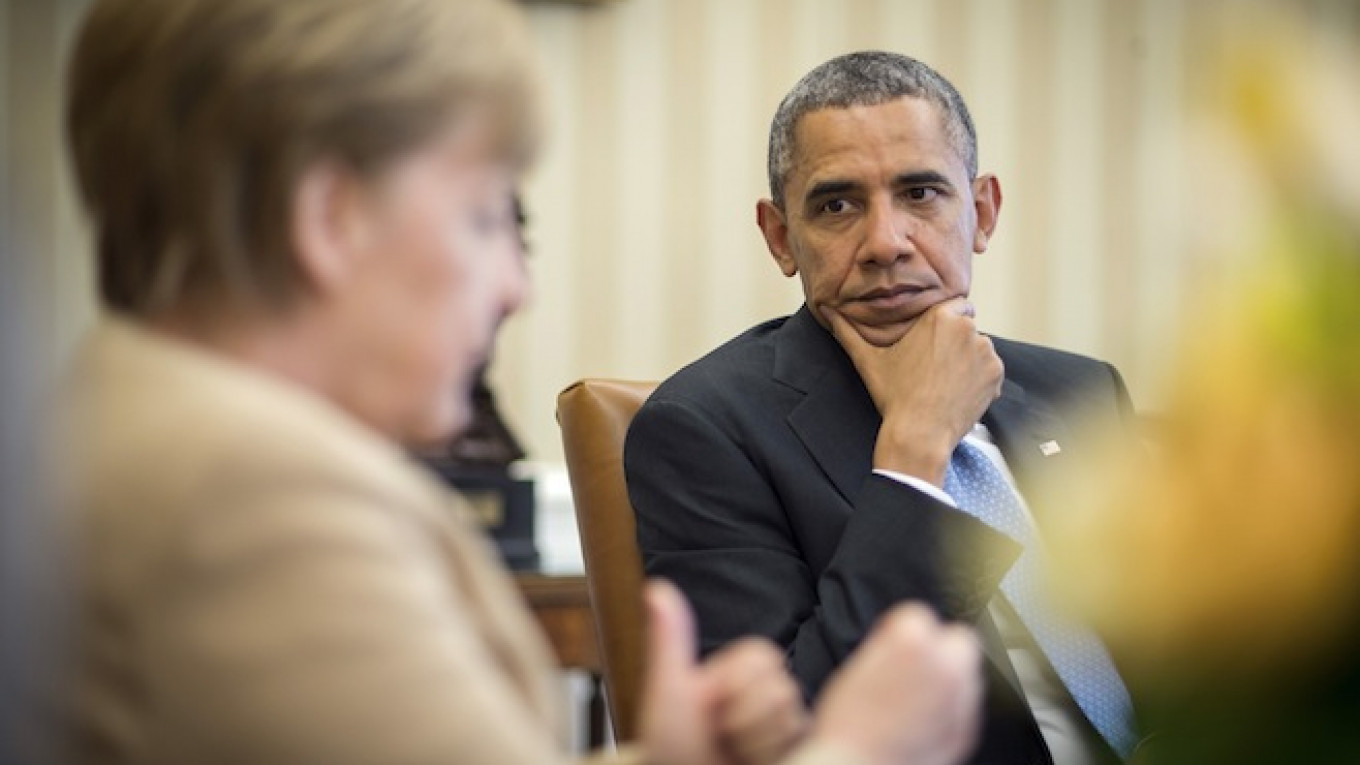U.S. President Barack Obama and German Chancellor Angela Merkel warned Russia it would face additional sanctions against key sectors of its economy if Moscow interferes with Ukraine's elections on May 25.
In a joint news conference on Friday following talks dominated by the situation in Ukraine, Obama and Merkel said they were united in their intention to implement tougher sanctions but made clear they were still deciding how to structure the measures should they be necessary.
The election is to choose a successor to ousted Ukrainian President Viktor Yanukovych, who fled Kiev in the face of unrelenting protests in February.
U.S. officials said a next round of sanctions could affect vital parts of the Russian economy such as energy, defense, financial services and engineering.
"If, in fact, we see the disruptions and the destabilization continuing so severely that it impedes elections on May 25, we will not have a choice but to move forward with additional, more severe sanctions," Obama said.
"The next step is going to be a broader-based sectoral sanctions regime," he said.
The U.S. and European allies have been carefully watching the movements of 40,000 Russian troops massed on Ukraine's eastern border and the takeover of buildings in cities in eastern Ukraine by armed pro-Russian militants.
Energy and Banking Next?
Obama and Merkel said they were determined the elections would go off peacefully and as scheduled so Ukraine could begin rebuilding its economy.
"May 25 is not all that far away," said Merkel. "Should it not be possible to stabilize the situation further, further sanctions will be unavoidable."
The U.S. and the EU have already imposed several rounds of sanctions on specific Russians, including some on members of Putin's inner circle, and several companies.
Moscow has largely shrugged off the penalties, although Obama said they were a factor in a decline in the Russian stock market and value of the ruble. The aim was not to punish Russia but to change its behavior, Obama said.
Energy and banking sectors are two of the most likely areas to be targeted if sanctions are widened. Europeans are concerned that going after Russia's energy market could hurt European economies that are dependent on its natural gas.
After her White House visit, Merkel said in remarks at the U.S. Chamber of Commerce that European policymakers would want to ensure a mix of sanctions that would spread the burden across member states.
"We have to make sure that the impact is spread fairly," she said.
Obama and Merkel were vague on how far the new round of sanctions might go if they were imposed.
"The idea that you're going to turn off the tap on all Russian oil or natural gas exports, I think, is unrealistic," said Obama. "But there are a range of approaches that can be taken not only in the energy sector but in the arms sector, the finance sector, in terms of lines of credit for trade — all (sectors) that have a significant impact on Russia."
Merkel said it could take time to wean Europeans off Russian natural gas. It was important to "look ahead in the medium term to what we can do in order to promote an energy union in the EU," particularly assessing dependencies in the next 10 to 15 years, she said.
Obama's Republican opponents made clear they feel he needs to be more forceful with Russia.
"I am deeply concerned that the administration continues to be so tepid and hesitant in using impactful sanctions even though they are fully aware of the aggressive destabilization Russia is causing in Ukraine," said Republican Senator Bob Corker.
Also see:
A Message from The Moscow Times:
Dear readers,
We are facing unprecedented challenges. Russia's Prosecutor General's Office has designated The Moscow Times as an "undesirable" organization, criminalizing our work and putting our staff at risk of prosecution. This follows our earlier unjust labeling as a "foreign agent."
These actions are direct attempts to silence independent journalism in Russia. The authorities claim our work "discredits the decisions of the Russian leadership." We see things differently: we strive to provide accurate, unbiased reporting on Russia.
We, the journalists of The Moscow Times, refuse to be silenced. But to continue our work, we need your help.
Your support, no matter how small, makes a world of difference. If you can, please support us monthly starting from just $2. It's quick to set up, and every contribution makes a significant impact.
By supporting The Moscow Times, you're defending open, independent journalism in the face of repression. Thank you for standing with us.
Remind me later.






